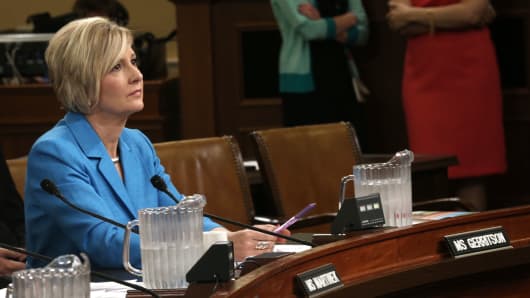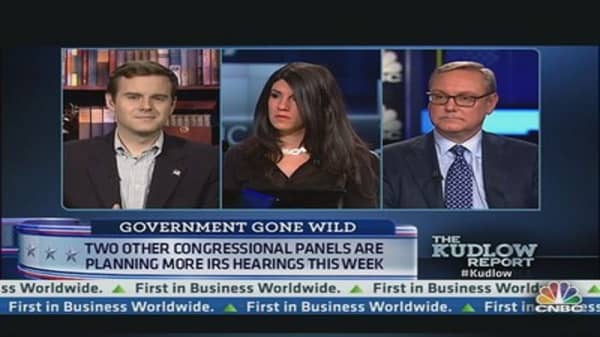During their appearances on Tuesday before the House Ways and Means Committee, the conservative group leaders described their dealings with the U.S. tax agency as a bureaucratic nightmare filled with endless delays that they said appeared to have been motivated by a distaste for the groups' beliefs.
Coalition for Life of Iowa president Sue Martinek recounted how an IRS employee asked that her group, which opposes abortion rights, agree in writing not to picket Planned Parenthood, an abortion provider.
"We had done nothing wrong. We had not indicated that we would do anything but peaceably assemble and hold up signs like, 'Stop abortion' and 'Pray to end abortion,"' said Martinek, joining other speakers in casting the IRS's actions as a violation of her group's constitutional right to speech.
Republican and Democratic lawmakers condemned the IRS for bungling the review process.
However, some Democrats questioned why the conservative groups believed they had a right to tax-exempt status, noting that federal law limits the political activities of tax-exempt groups.
"None of your organizations (was) kept from organizing or silenced. We are talking about whether or not the American public will subsidize your work" through tax breaks, said Representative Jim McDermott, a Democrat from Illinois. "Each of your groups is highly political."
Representative Paul Ryan, a Republican from Wisconsin and a favorite of the conservative Tea Party movement, received applause from the audience when he accused McDermott of blaming the conservative groups for the abuse they received.
"People were singled out because of their beliefs," Ryan said.
LAVISH CONFERENCES ALSO IN CROSSHAIRS
Several congressional committees and the Department of Justice have opened probes into the extra scrutiny given to conservative groups, which got headlines when IRS official Lois Lerner first apologized for the activity last month.
Lerner's comments came just before the release of a Treasury watchdog report that described how employees in the Cincinnati office in 2010 developed partisan criteria - including searching for words such as "Tea Party" and "Patriots" in group names - to flag certain tax-exempt applications for extra review.
The Treasury inspector general said he did not find evidence of outside political motivation, but said his office's reviews are ongoing.
Lawmakers are holding a series of hearings to determine whether the IRS had a political agenda in subjecting such groups to extra scrutiny, or if workers in the tax-exempt division used the partisan criteria simply as a way to cope with a flood of applications. Current and former officials have defended IRS employees by saying they were given the challenging task of determining the level and nature of political activity among groups applying for tax-exempt status.
The IRS, which is undergoing a broad review under new acting commissioner Danny Werfel, is also facing allegations that it spent excessively on training conferences. A Treasury watchdog report released Tuesday singled out a $4.1 million conference in Anaheim, California, in 2010 that included a spoof "Star Trek" video and lavish hotel suites.
In response, the IRS released a statement calling many of the expenses inappropriate, and noting that expenses for travel and training are down 80 percent since 2010.
House Oversight and Government Reform Chairman Darrell Issa, a California Republican, has called a hearing on the report for Thursday. Issa has been among the most aggressive critics of the IRS, saying on Sunday that the agency's scrutiny of conservative groups was "directly being ordered from Washington" - a conclusion that Democrats have called premature.
Asked about the impact of the IRS's extensive questioning of their applications, the groups described different experiences.
Kevin Kookogey, president of a group called Linchpins of Liberty, which says it aims to mentor students in conservative political philosophy, said he lost a $30,000 grant while waiting years for a decision for the IRS.
But Dianne Belsom of the Laurens County (South Carolina) Tea Party said the prolonged delays have not affected her group's activities. She said the group has been operating as a tax-exempt organization even as the IRS continues to review its application.
"I can't say this investigation has really impeded us," Belsom said.
After Tuesday's hearing, IRS chief Werfel issued a statement calling the groups' stories "troubling," and saying that he had directed an IRS team to review their cases.




